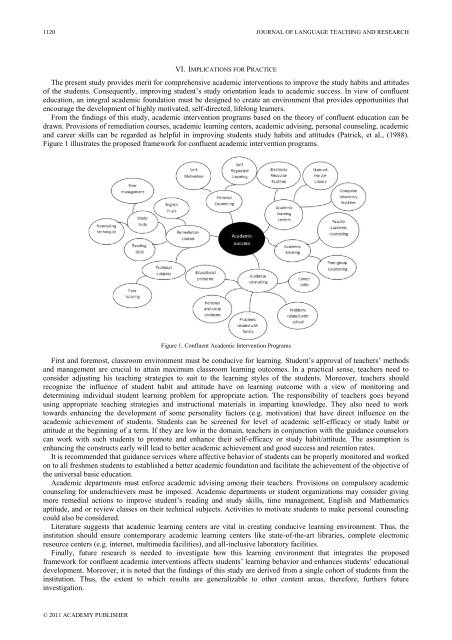Journal of Language Teaching and Research Contents - Academy ...
Journal of Language Teaching and Research Contents - Academy ...
Journal of Language Teaching and Research Contents - Academy ...
You also want an ePaper? Increase the reach of your titles
YUMPU automatically turns print PDFs into web optimized ePapers that Google loves.
1120<br />
© 2011 ACADEMY PUBLISHER<br />
VI. IMPLICATIONS FOR PRACTICE<br />
JOURNAL OF LANGUAGE TEACHING AND RESEARCH<br />
The present study provides merit for comprehensive academic interventions to improve the study habits <strong>and</strong> attitudes<br />
<strong>of</strong> the students. Consequently, improving student’s study orientation leads to academic success. In view <strong>of</strong> confluent<br />
education, an integral academic foundation must be designed to create an environment that provides opportunities that<br />
encourage the development <strong>of</strong> highly motivated, self-directed, lifelong learners.<br />
From the findings <strong>of</strong> this study, academic intervention programs based on the theory <strong>of</strong> confluent education can be<br />
drawn. Provisions <strong>of</strong> remediation courses, academic learning centers, academic advising, personal counseling, academic<br />
<strong>and</strong> career skills can be regarded as helpful in improving students study habits <strong>and</strong> attitudes (Patrick, et al., (1988).<br />
Figure 1 illustrates the proposed framework for confluent academic intervention programs.<br />
Figure 1. Confluent Academic Intervention Programs<br />
First <strong>and</strong> foremost, classroom environment must be conducive for learning. Student’s approval <strong>of</strong> teachers’ methods<br />
<strong>and</strong> management are crucial to attain maximum classroom learning outcomes. In a practical sense, teachers need to<br />
consider adjusting his teaching strategies to suit to the learning styles <strong>of</strong> the students. Moreover, teachers should<br />
recognize the influence <strong>of</strong> student habit <strong>and</strong> attitude have on learning outcome with a view <strong>of</strong> monitoring <strong>and</strong><br />
determining individual student learning problem for appropriate action. The responsibility <strong>of</strong> teachers goes beyond<br />
using appropriate teaching strategies <strong>and</strong> instructional materials in imparting knowledge. They also need to work<br />
towards enhancing the development <strong>of</strong> some personality factors (e.g. motivation) that have direct influence on the<br />
academic achievement <strong>of</strong> students. Students can be screened for level <strong>of</strong> academic self-efficacy or study habit or<br />
attitude at the beginning <strong>of</strong> a term. If they are low in the domain, teachers in conjunction with the guidance counselors<br />
can work with such students to promote <strong>and</strong> enhance their self-efficacy or study habit/attitude. The assumption is<br />
enhancing the constructs early will lead to better academic achievement <strong>and</strong> good success <strong>and</strong> retention rates.<br />
It is recommended that guidance services where affective behavior <strong>of</strong> students can be properly monitored <strong>and</strong> worked<br />
on to all freshmen students to established a better academic foundation <strong>and</strong> facilitate the achievement <strong>of</strong> the objective <strong>of</strong><br />
the universal basic education.<br />
Academic departments must enforce academic advising among their teachers. Provisions on compulsory academic<br />
counseling for underachievers must be imposed. Academic departments or student organizations may consider giving<br />
more remedial actions to improve student’s reading <strong>and</strong> study skills, time management, English <strong>and</strong> Mathematics<br />
aptitude, <strong>and</strong> or review classes on their technical subjects. Activities to motivate students to make personal counseling<br />
could also be considered.<br />
Literature suggests that academic learning centers are vital in creating conducive learning environment. Thus, the<br />
institution should ensure contemporary academic learning centers like state-<strong>of</strong>-the-art libraries, complete electronic<br />
resource centers (e.g. internet, multimedia facilities), <strong>and</strong> all-inclusive laboratory facilities.<br />
Finally, future research is needed to investigate how this learning environment that integrates the proposed<br />
framework for confluent academic interventions affects students’ learning behavior <strong>and</strong> enhances students’ educational<br />
development. Moreover, it is noted that the findings <strong>of</strong> this study are derived from a single cohort <strong>of</strong> students from the<br />
institution. Thus, the extent to which results are generalizable to other content areas, therefore, furthers future<br />
investigation.

















